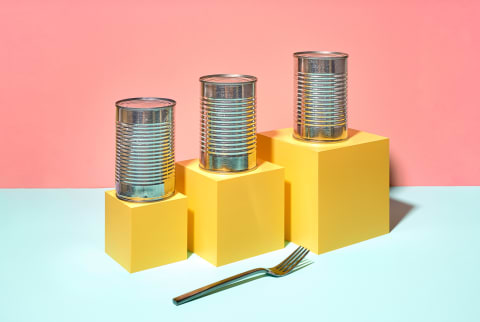Advertisement
7 Of The Best Canned Foods To Enjoy Right Now (And Always)


To make your culinary burden a bit lighter while still enjoying satisfying meals, we've rounded up a list of healthy canned foods to add to your pantry.
Each of these convenient options can make all your daily meals quick, simple, and plenty nutritious:
Fish
Canned fish, including salmon, tuna, and sardines, are low in cost and rich in nutrients. Salmon, in particular, is "a great source of omega-3 fatty acids, which helps offset1 the negative effects of the stress hormone cortisol," Jess Cording, M.S., R.D., CDN, says.
When choosing fish, functional medicine doctor Mark Hyman, M.D., says, "SMASH" or salmon, mackerel, anchovies, herring, and sardines, are lowest in mercury. While tuna doesn't fall into that category, the U.S. Food and Drug Administration still places it on their "best choices" list and recommends eating two to three servings per week2.
To increase your zinc intake, add canned oysters to the list. Just 3 ounces provides 673% of your daily zinc value, according to the National Institutes of Health (NIH).
For a quick and healthy lunch using nutritious canned fish, try this avocado salmon salad.
Water chestnuts
If you think water chestnuts only offer texture to your dishes, think again. "You'll get about 3 grams of fiber per serving3 as well as 17% of your daily needs for potassium and manganese," Cording says.
If that isn't enough, Abby Cannon, J.D., R.D., CDN, adds, "They're also a good source of the essential nutrients vitamin B6, potassium, copper, and even protein." With all of that nutritional value, the satisfying crunch is just an added bonus.
To make the most out of your nonperishables, make these Asian lettuce wraps with water chestnuts and canned or dried white beans.
Roasted red peppers
Canned is not always synonymous with bland, and roasted red peppers are a great example. While there are unflavored varieties packaged in water, roasted red peppers also come soaked in oil or seasoned (seriously, try the fire-roasted version).
Taste is just one of the many benefits of canned red peppers, though. They are also high in beta-carotene, an antioxidant that transforms into vitamin A and helps support healthy skin. According to Molly Knudsen, M.S., RDN, they are also high in vitamin C, which helps protect the immune system by fighting against free radicals.
So, if Friday is typically pizza night for you and your family, make a homemade dough and throw these peppers on top for an added nutritional and immunity boost.
Artichokes
Why put your fingers at risk by trimming sharp leaves off a fresh artichoke when you can get the same benefits from an already dismantled canned version? They are higher in sodium than most canned vegetables, and simply soaking, rinsing, and patting your canned artichokes dry can optimize their health benefits.
One can of artichoke hearts contains 5 grams of fiber and 3 grams of protein, Knudsen tells mindbodygreen, as well as containing potassium, calcium, and even some iron.
If you're in a lunchtime rut, break out of it with this bright spring cobb salad with asparagus, artichokes, and avocado.
Tomatoes
Canned tomatoes contain the antioxidant lycopene, which helps support the immune system by reducing inflammation. The juicy canned fruit adds a familiar and comforting flavor to most dishes. Whether it's a tomato soup, a shakshuka, or this vegan lasagna, canned tomatoes are a cozy quarantine companion.
Chickpeas
Canned chickpeas are a versatile superfood. In fact, cardiologist Joel Kahn, M.D., writes, "Health benefits attributed to diets rich in chickpeas have been identified in terms of diabetes, heart health, GI health, cholesterol, and even weight loss."
Once you drain and rinse chickpeas, they "are wonderful to add directly to your dish—like salad, pasta, or soup—for extra protein and fiber," Cannon says. While chickpeas complement dishes well, don't underestimate their ability to rule the main course, like in this chickpea stew or oven-baked falafel.
Cannellini beans
Cannellini beans, like chickpeas and other white beans, are packed with fiber and protein. Aside from that, Cording says they're high in zinc, which helps to maintain proper functioning of the immune system by activating T-lymphocytes (aka T-cells)4.
Add these beans to salads or chilis, or puree them to make a snackable white bean dip.
The takeaway
Eating healthy is one way to keep your immune system strong; But there's more than one way to eat healthfully, and canned foods are one way to get nutrients in a convenient package.
"If you're unable to eat exactly as you normally would to feel your best, show yourself some compassion." Try your best, and make the most out of your pantry.